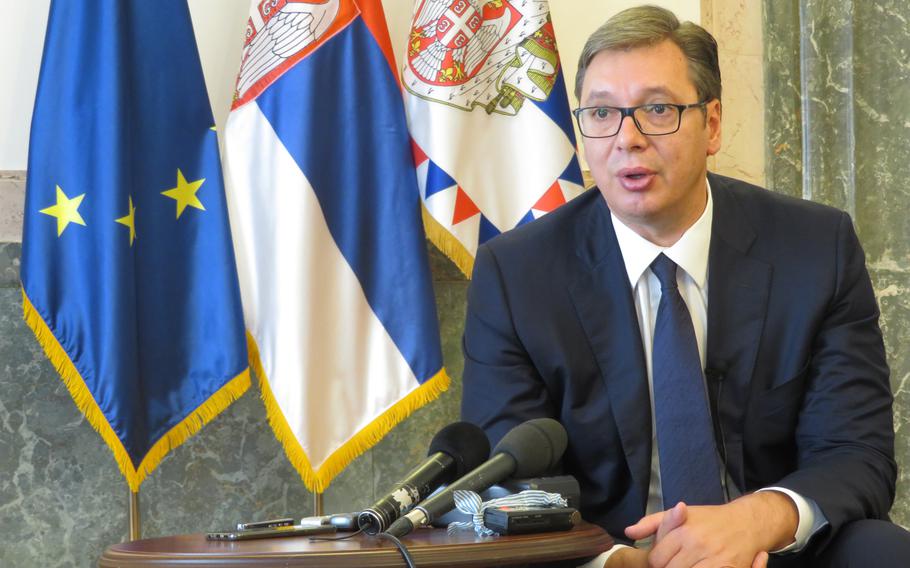
Serbian\ President Aleksandar Vucic speaks during an interview by the Chinese media in Belgrade, Serbia, on Aug. 6, 2018. Serbia and Kosovo have failed to normalize relations. (Dong Longjiang, Xinhua, Zuma Press/TNS)
(Tribune News Service) — The U.S. stepped up criticism of Kosovo’s crackdown on the use of the Serbian currency, which included seizing a vehicle transporting social benefit payments for the members of nation’s Serbian minority.
The actions of Kosovo’s government have “direct and negative” effects on ethnic Serbs and are “unnecessarily raising ethnic tensions,” U.S. Ambassador Jeff Hovenier said on social network X late Saturday.
That in turn limits the options of the U.S. “to serve as an effective advocate for Kosovo in the international arena,” Hovenier said.
The U.S. reaction came after Kosovan police held raids in multiple locations, detaining post office workers and seizing cash in dinars intended to pay out pensions, salaries and welfare for local Serbs.
European Union external affairs spokesman Peter Stano noted “great concern” about the police operations in a post on X. “The sudden closure of these offices will have negative effects on the daily lives and living conditions of Kosovo-Serb communities,” he said.
Tensions between the Balkan neighbors escalated again last week after Kosovo’s authorities decided to enforce the euro as its sole currency. The move, which seeks to ban the use of the Serbian dinar, could endanger lifelines of Serbs in Kosovo and has been heavily criticized by Belgrade, the European Union and the U.S.
Zlatan Elek, the head of a hospital in the biggest remaining Serb-majority area and the leader of the main Serb political party in Kosovo, said he had urged Hovenier to help prevent an “exodus,” or be complicit in policies that threaten to drive out the remaining 90,000 ethnic Serbs there — already less than a third of their pre-war population.
“They will be direct accomplices in case of an exodus of Serbs from Kosovo,” Elek told reporters in northern Mitrovica. “Blocking payments presents a problem for all Serbs” in Kosovo, as most families have funding from Belgrade as their sole source of income.
The currency restrictions risk further deepening the rift between the former wartime foes at a time tensions are already the worst in over two decades. E.U. and U.S. diplomats have so far failed to push Serbia and Kosovo to normalize relations, a requirement to join the E.U.
Serbia, which refuses to recognize Kosovo, a former province that unilaterally declared independence in 2008, is rallying support of international allies to help convene a U.N. Security Council meeting on the latest setback.
With assistance from Gresa Kraja.
©2024 Bloomberg L.P.
Visit bloomberg.com.
Distributed by Tribune Content Agency, LLC.